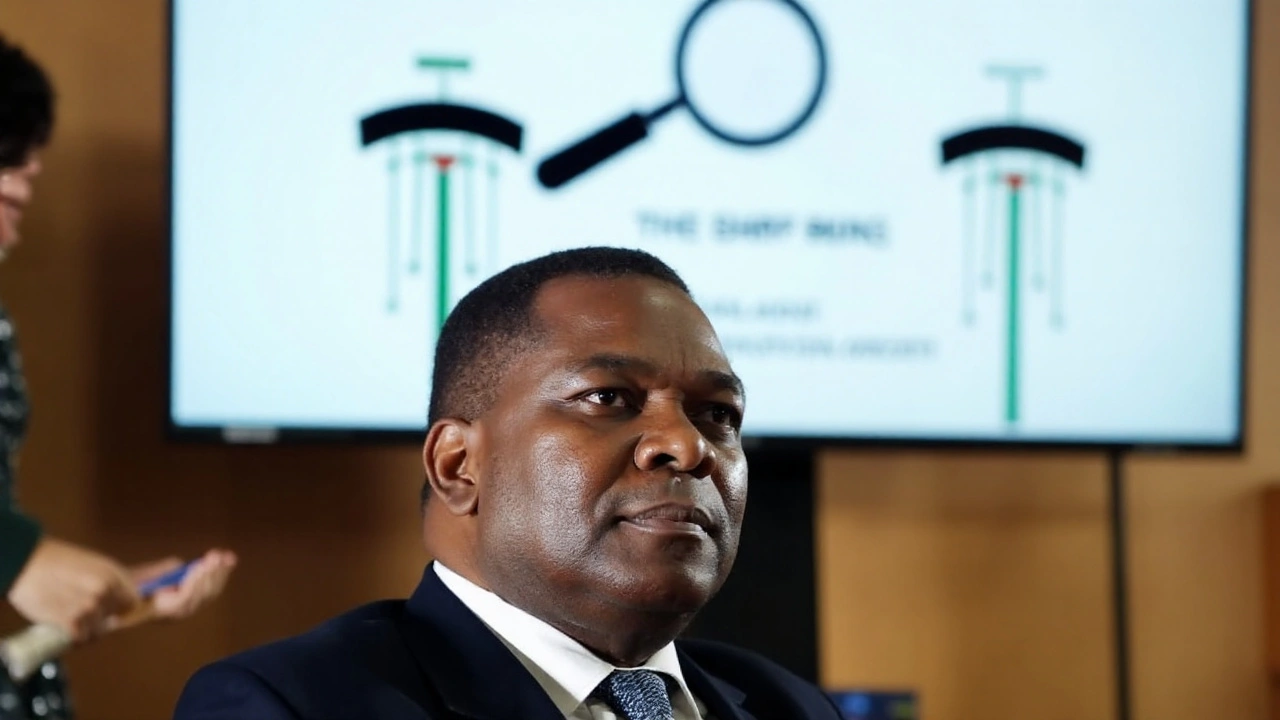Why Van Rooyen’s Testimony Matters
When the Madlanga Commission opened its doors to a third witness, the room buzzed with anticipation. Major‑General Petronella van Rooyen, who runs the legal division of the South African Police Service (SAPS), was slated to break down the very statutes that dictate what the police can and cannot do. Her appearance comes after two high‑profile police commissioners—Nhlanhla Mkhwanazi of KwaZulu‑Natal and national chief Fannie Masemola—painted a bleak picture of political interference and warned that criminal syndicates were closing in on the justice system.
Van Rooyen started by describing her place in the SAPS command chain. She reports to the divisional commissioner of legal services, which sits under the deputy national commissioner. From there, the line climbs to either General Lineo Nkhuoa or General Puleng Dimpane, and ultimately to the National Commissioner. This hierarchy, she explained, is designed to keep legal advice insulated from political pressure, yet recent events suggest the shield may be cracking.
Her primary focus was the instruction from Police Minister Senzo Mchunu to dissolve the KwaZulu‑Natal Political Killings Task Team (PKTT). The task team was created to investigate a spate of politically motivated murders, but its abrupt dismantling raised eyebrows across the country. Van Rooyen clarified which sections of the SAPS Act and the Police Services Amendment allow a minister to issue such orders, and where the limits of that power lie.

Implications for Police Accountability
Beyond the legal nit‑picking, van Rooyen’s testimony hits at the heart of accountability. If the minister can unilaterally revoke specialized units, what checks exist to prevent abuse? The commission is now zeroing in on three critical questions:
- Which statutory provisions grant the Police Minister authority over task‑specific formations?
- How does the SAPS legal division monitor compliance with those provisions?
- What recourse do senior police officials have if they believe an order threatens the rule of law?
Answers to these could determine whether the SAPS remains a tool of the state or a genuinely independent arm of justice. Observers note that the previous testimonies hinted at a systemic erosion: senior politicians allegedly pressuring police chiefs, interference in investigations, and a growing sense that illegal syndicates are slipping through the cracks.
Van Rooyen also highlighted the role of internal oversight bodies, such as the Independent Police Investigative Directorate (IPID) and the Police Service Commission. She argued that without clear legislative backing, these bodies struggle to hold ministers and senior officers to account. Her remarks suggest that reform may need to start with tightening the language around ministerial powers, not merely punishing individual actors.
Stakeholders—from civil society groups to opposition parties—are watching closely. If the commission can pinpoint where legal authority ends and political overreach begins, it could pave the way for legislation that fortifies the police service against future meddling. The next days of hearings will likely probe deeper into the procedural safeguards, or lack thereof, that allowed the PKTT’s dissolution.








Nathan Ryu
September 25, 2025 AT 21:20We cannot stand by while political puppeteers manipulate the very institutions meant to safeguard our rights. The testimony of van—Rooyen is a stark reminder that legal safeguards are only as strong as the moral will behind them. If the minister can unilaterally tear down the PKTT, then any citizen's trust in justice is eroded. It is incumbent upon civil society to demand crystal‑clear statutory limits and enforce them without compromise. Anything less is a betrayal of the social contract.
Atul Zalavadiya
September 25, 2025 AT 22:26We shall dissect the intricate statutory framework that underpins the authority of the Police Minister, a task that demands both precision and a comprehensive grasp of legislative intent. The SAPS Act, in conjunction with the Police Services Amendment, delineates a narrow corridor of ministerial prerogative, explicitly confining it to operational exigencies rather than political reconfiguration. Contemporary jurisprudence, as illuminated by the Supreme Court’s 2022 ruling in State v. Mkhonto, underscores that any deviation from this corridor must withstand rigorous judicial scrutiny, lest it constitute an unlawful usurpation of executive power. Moreover, the hierarchical architecture of the SAPS, from the divisional commissioner of legal services up through the National Commissioner, is architected to provide a buffer against capricious political interference, a safeguard that appears increasingly porous. Van Rooyen’s elucidation of this architecture reveals that while procedural safeguards exist on paper, their practical efficacy is contingent upon the unwavering integrity of each tier, from General Lineo Nkhuoa to General Puleng Dimpane. The dissolution of the PKTT, devoid of transparent legislative justification, raises a red flag reminiscent of the “shadow governance” phenomena observed in transitional democracies, where the de facto locus of power migrates away from codified statutes. It is therefore imperative that the Madlanga Commission not only catalogues the statutory breaches but also proposes a robust amendment to fortify the language surrounding ministerial powers, perhaps by instituting a mandatory parliamentary review clause. Such a provision would embed an additional layer of democratic legitimacy, aligning South Africa’s policing framework with the best practices espoused by the United Nations Office on Drugs and Crime. Finally, we must acknowledge the role of auxiliary oversight bodies-IPID and the Police Service Commission-whose functional capacity is inextricably linked to the clarity of the legal scaffolding that governs ministerial directives. Without unequivocal statutory backing, their mandate remains tenuous, leaving the very fabric of accountability frayed. In summation, the path forward demands legislative recalibration, vigilant civil engagement, and an unwavering commitment to the rule of law, lest the specter of political overreach continue to loom over the SAPS. The commission's findings should be transmitted to the National Assembly with a recommendation for a bipartisan task force to monitor implementation. Continuous public reporting will ensure that any future ministerial orders are transparently justified and subject to judicial review. Only through such systemic vigilance can South Africa safeguard its democratic ideals and prevent the police from becoming an instrument of political expediency. Citizens must remain alert, organized, and ready to hold their leaders accountable at every turn.
Amol Rane
September 25, 2025 AT 23:33The dissolution of a specialized task force, when examined through the prism of institutional philosophy, reveals a disturbing nihilism at the heart of contemporary governance. One might argue that the very notion of a "political killings task team" embodies the paradox of state-sanctioned morality, a concept I find both grotesquely inevitable and intellectually stimulating. Yet van Rooyen's exposition, while meticulously detailed, fails to grapple with the metaphysical erosion of legitimacy that accompanies such unilateral decree. The legalistic veneer merely masks a deeper ontological crisis: Who, if not the sovereign, retains the authority to dismantle the mechanisms that safeguard the public good? In this light, the commission's pursuit borders on an ivory‑tower exercise, detached from the lived reality of a populace yearning for authentic accountability. Thus, the true question is not merely statutory but existential: can a legal framework ever truly contain the capricious impulses of power?
Venkatesh nayak
September 26, 2025 AT 00:40The hierarchy Van Rooyen described is supposed to act as a firewall against political meddling, yet the recent events suggest the firewall is more of a paper screen. It's baffling how quickly a minister can issue an order that ripples through the entire chain of command. The legal provisions cited are clear, but their interpretation is evidently pliable under pressure. We need stricter legislative language to prevent such ambiguities :) Moreover, transparent reporting mechanisms would help rebuild trust.
rao saddam
September 26, 2025 AT 01:46Enough is enough!!! The SAPS cannot be a pawn in ministerial chess moves!!! Every unilateral dissolution sends a chilling message to every officer who dares to uphold the law!!! We must demand immediate parliamentary oversight, and we must hold the minister publicly accountable!!! This is not a mere bureaucratic tweak; it is a battle for the soul of our justice system!!!
Prince Fajardo
September 26, 2025 AT 02:53Oh sure, because dissolving a task force is always the best way to protect justice.
Subhashree Das
September 26, 2025 AT 04:00The data presented by van Rooyen, when cross‑referenced with the minutes from the PKTT hearings, reveals a pattern of selective transparency that borders on manipulation. Her reliance on ambiguous statutory language appears intentional, designed to obscure the minister's overreach. The oversight bodies, particularly IPID, are hamstrung by a lack of explicit empowerment, a flaw that the commission must spotlight. Moreover, the internal legal division's monitoring mechanisms are evidently insufficient, as evidenced by the swift compliance with the ministerial order. This systemic weakness encourages a culture of impunity, where political directives eclipse legal safeguards. It is imperative that any reform proposal include concrete mandates for independent review and enforceable penalties for non‑compliance. Only then can we hope to restore any semblance of credibility to the SAPS hierarchy.